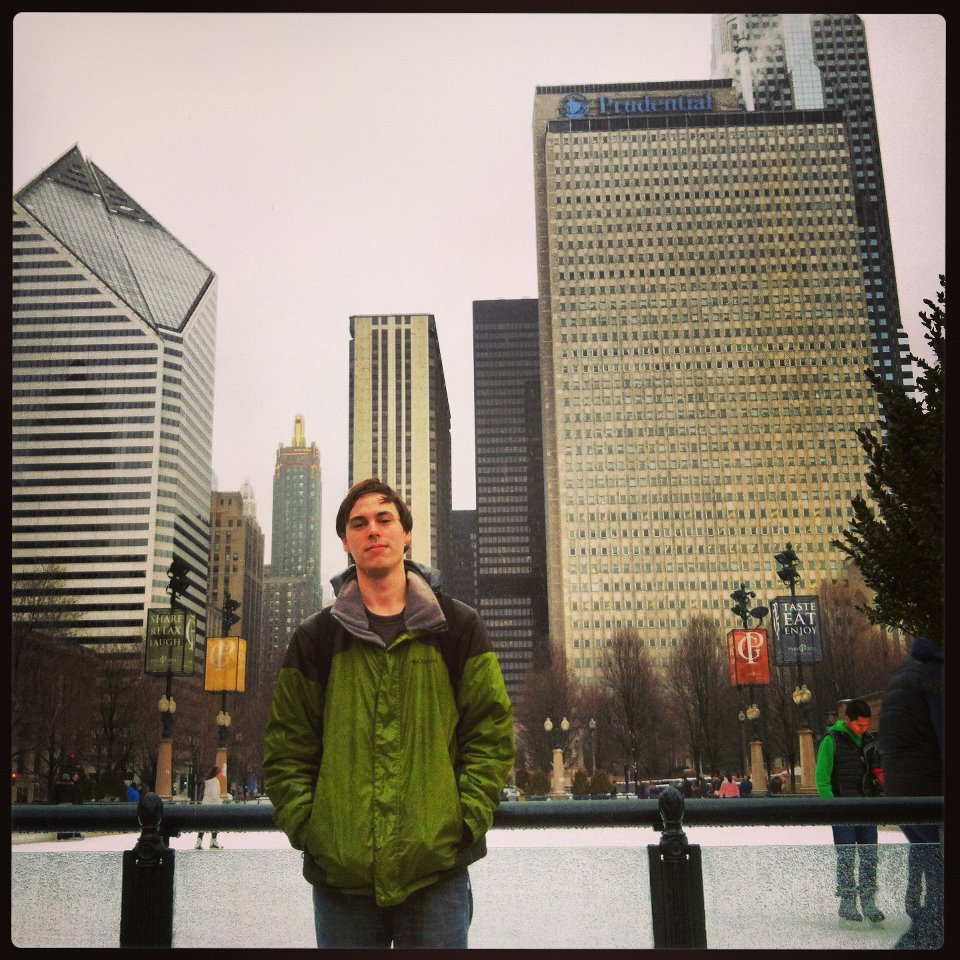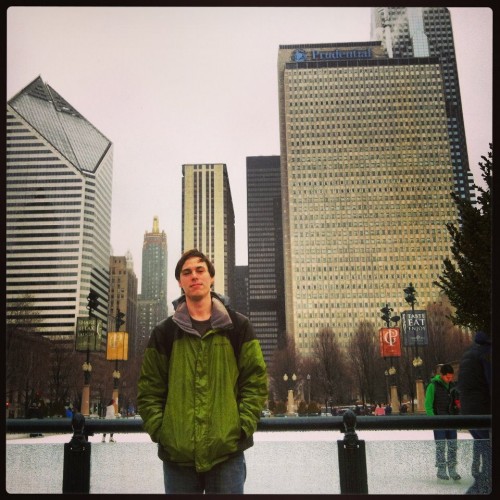
Student Spotlight: James Eidson
In a class of 11 poets, we get close. But not always close enough. With the maelstrom of putting together a thesis, teaching, and working, getting time to hang out with classmates is sometimes hard. But when we do, it’s always worth it. Here’s a quick look at what my classmate, MFA Poetry candidate James Eidson, thinks about poetry and what he’s been up to lately.
Daniel: In the same way that everybody’s got a “first kiss” story—some more remarkable or awkward than others (mine was at church camp in middle school, for example)—almost all poets remember their first real encounter with poetry, the experience when you realize that this is a course of pursuit. What can you tell us about how you first came to poetry?
James Eidson: Well, it was better than my first kiss. I’d been in a bad relationship for about 5 years, which I’d taken with me to college. When that collapsed, I began to question myself a lot—felt less defined, and had more of a freedom and need to live with myself. When I had some luck in a poetry workshop with Bruce Bond, I felt like I had access to a more earnest, self-disciplined kind of confidence. I kept at it, and poetry has become a home I can take anywhere.
DSP: What first put Columbia College Chicago on your radar, and what ultimately led you to pursue your graduate study here?
JE: I admired David Trinidad’s work—especially his Plath poems. I was also looking to get something of The New School’s equivalent in an affordable environment: Chicago. Upon scouring the MFA rankings for edgier schools in big cities, Columbia seemed, in its faculty and location, to be at the volatile crossroads of American life and American poetry. There’s a lot of room to find your own identity here. The expectations can be loose, and yet, that absence can be very self-reflexive.
DSP: You’ve had a solid year of publications coming out—Forklift Ohio, E-ratio, Leveler, Arsenic Lobster, and more still coming out, which is terrific! How did you become acquainted with these particular publications, and what’s that process been like for you? Are there any tips you’d give to prospective students about publishing poems during graduate school?
JE: As far as publications go, my first year in the program was dismal. I didn’t know what contemporary poetry was and sent out all this work in a wonky T.S. Eliot voice I couldn’t manage. I think, second semester, I started to embrace my own a little—that it might be scattered and rough, as opposed to meticulous, which I’m not. That gave me freedom to say things I actually wanted to say—to quibble less about elegance and rhetoric—to not try so hard as to ruin my chance to write anything natural.
I also started networking, which isn’t something I’m natural at. Writing reviews and doing interviews can be a great back door into the conversation. This helped me get into some journals where I never thought I’d see my work. On the one hand, networking can feel disingenuous. On the other, a lot of magazines are clubs. Accepting the landscape of your art-world, and how it operates can be as important to being heard as good writing. It’s a humble kind of shamelessness to admit that poetry is also business. I think, to really play this game, one must be prepared to deal with it, even when it’s less romantic than you might have hoped for. But really, what’s so cunning about doing people favors, or making friends at readings? The poetry-business world is about as intimate as business worlds get, and so participatory that I don’t think you have to commodify your work in order to be included. You might have to learn how to make a case for yourself, but in many ways, that conviction probably arises most convincingly from really caring about “who you really are,” or better, what you really have to say.
Finally, once my resume began to form, I began to think about the different relationships journals might have with one another—how getting into one might help brace another to accept you into their community. Much like language, the publishing-sphere spins webs, so that chains of associations between magazines take on circuitry. You see it all the time in the bios—how a lot of writers’ publications seem patterned around a scene or style. Paying attention to the shape of different networks can be useful.
DSP: Can you give a quick top ten list of books you’ve read since beginning the program?
JE: These are great books:
Robert Grenier: A Day at the Beach
Mary Ruefle: Madness, Rack, and Honey
Genyadi Aygi: Selected Poems
Ronaldo Wilson: Poems of the Black Object
Bridget Pegeen Kelly: The Orchard
C.D. Wright: Deep-step Come Shining
Julianna Spahr: Fuck You, Aloha, I Love You
Abraham Smith: Hank
John Keats: Selected Letters
Mario Santiago Papasquiero: 1 Disciple of Marx to 1 Heidegger Fanatic
DSP: What has been one of the most enriching experiences you’ve had while at Columbia, and how do you think this has affected you as a poet or your own poetics?
JE: To be more general, my cohort has been incredible to watch. So many of them have worked miracles, even in their time here. To see people get books and residencies up-close gives me a lot of faith that my aspirations aren’t ridiculous, and too, a clearer view of what kind of compromises I should be making with myself and not to forget which kinds of quirks succeed and fail.
And to be more specific, Lisa Fishman—core-faculty here—has really given me the time and understanding I’d hoped for out of a graduate experience. She’s helped me to form intelligence from insecurity—to embrace my difficulties of expression as facts of the ego I write with—I mean, to write with my stupidity and self-loathing more confidently. I think embracing my shame and guilt as someone who thinks they deserve to be heard makes for a surprising and intense dimension of honesty in my work, at least I hope.
Finally, I have to say that my friend and peer, Matthew Sharos has given me the privilege to learn this art with two minds. Being alone in Chicago can be confusing. Matt has been a life-line and outside perspective I’ve really gotten to know. Getting into other people’s heads and seeing your work through their eyes is important. Sam Schaefer is another buddy I have to mention. Props also go to the unrelated Max Cohen of Amherst.
More importantly, loving your community, outside the realms of romance, family, or friendship (even), is a strange blessing. My cohort is a team, and we’ve really learned how to nurture one another. There are probably people in the program I like better than others, but even so, to try and get deeply in touch with someone’s work that you may not have a very natural connection with is fascinating and healthy.
DSP: Graduation is in just a few months. What’s next after grad school?
JE: I plan on reading novels, loving more, paying better attention to my dog, quitting smoking, drinking less, and publishing enough copies of my first book, so that I can build something like a card-house out of them, and not have to pay rent. I also might start wearing a mining-lamp on my head so that the path before me always seems bright.

